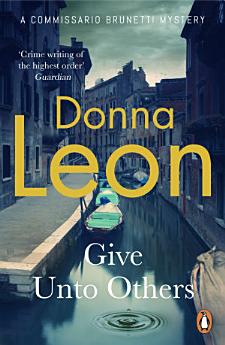Give Unto Others
Mar 2022 · Random House
4.4star
11 reviewsreport
Ebook
320
Pages
family_home
Eligible
info
reportRatings and reviews aren’t verified Learn More
About this ebook
'Crime writing of the highest order' GUARDIAN
'Donna Leon has been giving unto us for all of the thirty years since Death at La Fenice introduced us to Brunetti' Val McDermid
The gifted Venetian detective returns in his 31st case - this time, investigating the Janus-faced nature of yet another Italian institution. Brunetti will have to once again face the blurred line that runs between the criminal and the non-criminal, bending police rules, and his own character, to help an acquaintance in danger.
'Both tremendously enjoyable and deeply humane' JESSIE GREENGRASS, Costa-shortlisted author of The High House
'Leon's elegant, witty prose . . . is a joy' AMANDA CRAIG
'Donna Leon has been giving unto us for all of the thirty years since Death at La Fenice introduced us to Brunetti' Val McDermid
The gifted Venetian detective returns in his 31st case - this time, investigating the Janus-faced nature of yet another Italian institution. Brunetti will have to once again face the blurred line that runs between the criminal and the non-criminal, bending police rules, and his own character, to help an acquaintance in danger.
'Both tremendously enjoyable and deeply humane' JESSIE GREENGRASS, Costa-shortlisted author of The High House
'Leon's elegant, witty prose . . . is a joy' AMANDA CRAIG
Ratings and reviews
4.4
11 reviews
Marianne Vincent
- Flag inappropriate
March 16, 2022
Give Unto Others is the thirty-first book in the Commissario Brunetti series by award-winning American-born author, Donna Leon. Venice, in the pandemic’s tail end, and the Questura is not overrun with criminal cases, so Brunetti agrees to look into a private matter, off the books, for a former neighbour. Elisabetta Foscarini is concerned for her daughter Flora when her son-in-law, an accountant, begins acting out of character and mentions possible harm to people who know what is happening. Brunetti and Commissario Claudia Griffoni (because he brings her in without hesitation) quickly conclude that Enrico Fenzo’s remarks must refer to one of his clients who, on initial examination, seem innocuous, not ringing any alarm bells. But Brunetti also decides to look into a charity that Enrico helped his father-in-law set up pro-bono, something that seems to have potential when his colleague Ispettore Lorenzo Vianello explains how little official oversight there appears to be on these entities. Of particular interest are the two other principals of the charity. Before long, Brunetti has enlisted Officer Pucetti for a little undercover nosing about, Signorina Elettra Zorza (who has a certain bug concern of her own) to gather information, and his mother-in-law, Contessa Donatella Falier to broker introductions, all without official sanction. Each of them would understand the inherited debt of kindness behind it. Weather and tides and looting by “baby gangs” require a bit of real police work, but then the vandalism of Flora’s veterinary clinic on Murano, which might be linked to their enquiries, gives their work official standing. What they ultimately uncover presents them with a dilemma, which is then taken out of their hands by others. But the deeper truth, when Brunetti uncovers it, admonishes him for forgetting to be a policeman when he most needed to. Leon gives the reader a very appealing protagonist who is ready to admits his faults and failings. His inner monologue is often engaging, and his philosophical musings, for example about the similarities between pickpockets and those claiming pandemic handouts, are insightful. The dialogue is often entertaining: ‘Do you think you can do this?’ ‘It might take a day or two,’ Signorina Elettra answered, tapping the erasered end of her pencil against the paper. ‘If it’s a small project, then it’s unlikely they’ll have adequate protection.’ ‘Against what?’ Brunetti asked. ‘Me.’ and there is a certain Netflix conversation with a colleague that cleverly disguises the real subject of their discussion from unwanted listeners. Leon throws in distractions and red herrings and leads the reader not at all where they thought they were going. Bound to appeal to those who love Venice, this is intelligent crime fiction at its finest. This unbiased review is from an uncorrected proof copy provided by NetGalley and Grove Atlantic.
About the author
Donna Leon is author of the much-loved, best-selling series of novels featuring Commissario Brunetti and one of The Times' 50 Greatest Crime Writers. Widely considered one of the best detective series ever, with admirers including Ursula K. Le Guin and Antonia Fraser, the Brunetti Mysteries have won numerous awards around the world and been translated into thirty-five languages.
Rate this ebook
Tell us what you think.
Reading information
Smartphones and tablets
Install the Google Play Books app for Android and iPad/iPhone. It syncs automatically with your account and allows you to read online or offline wherever you are.
Laptops and computers
You can listen to audiobooks purchased on Google Play using your computer's web browser.
eReaders and other devices
To read on e-ink devices like Kobo eReaders, you'll need to download a file and transfer it to your device. Follow the detailed Help Center instructions to transfer the files to supported eReaders.







